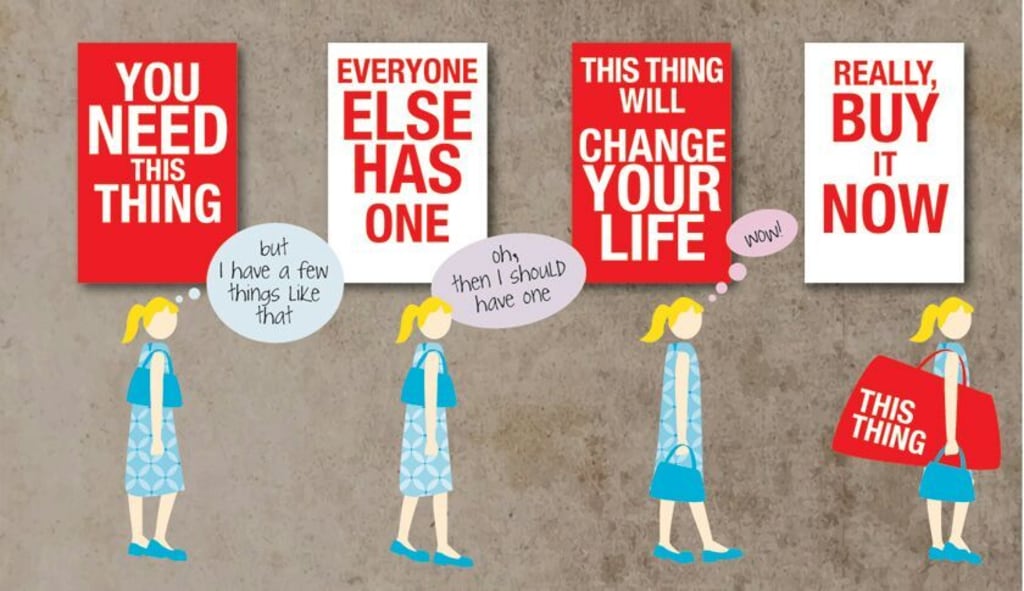
Hey there, lovely readers!
Today, I want to delve into a topic that has been on my mind for quite some time now: the culture of consumerism. We're all familiar with it, aren't we? It's that overwhelming urge to buy, buy, and buy some more, often driven by a desire to keep up with the latest trends, advertisements, and societal pressures. Let's take a moment to explore this fascinating yet concerning aspect of our modern lives.
Now, don't get me wrong – I love treating myself to something special once in a while, and I'm sure many of you do too. There's nothing wrong with wanting nice things and enjoying the occasional shopping spree. However, when consumerism becomes a dominant force in our lives, it can start to affect us in ways we may not even realize.
The culture of consumerism is deeply ingrained in our society. From the flashy billboards lining the streets to the seemingly irresistible online ads that pop up on our screens, we are bombarded with messages telling us we need the latest gadgets, the trendiest clothes, and the shiniest new products to be happy and successful. It's easy to fall into the trap of believing that possessions equal happiness, and that the more we have, the more fulfilled we'll be.
It is a simple thing to have a treasure trove of beauty items on the dressing table of elite women, worth thirty-thirty thousand, enough to make anyone's jaw drop. Order perfume from Paris, that's all it will cost. They are prestige symbols, they show your status in the society. Men are also not far behind in this race. Earlier their work was done with soap and oil. After shave and cologne came later. Now dozen or two dozen things have been added to this list.
But let's take a step back and think about it. How often have we bought something on impulse, only to have it gather dust on a shelf after a few days or weeks? I know I've done it, and it's a common experience many of us share. That instant gratification we get from buying something new often fades away quickly, leaving us seeking the next purchase to fill that void.
One of the downsides of consumerism is its impact on the environment. With so much emphasis on producing and consuming goods, the demand for resources increases significantly. This leads to deforestation, pollution, and a myriad of other environmental issues. As a conscious consumer, I can't help but feel a sense of responsibility to consider the impact of my choices on the planet.
Moreover, the culture of consumerism can also take a toll on our mental well-being. We often desire what the rich have, leading to constant comparisons and feelings of inadequacy and fuel a never-ending cycle of wanting more. It's essential to recognize that true happiness doesn't come from material possessions but from meaningful experiences, connections with others, and personal growth.
So, what can we do to combat the negative aspects of consumerism and find a healthier balance in our lives?
Firstly, let's become more mindful of our purchasing habits. Before buying something, ask yourself if it's. something you genuinely need or if it's merely a passing want. By being more intentional with our choices, we can reduce unnecessary spending and make room for things that truly matter.
Secondly, let's prioritize experiences over possessions. Instead of focusing solely on material goods, invest time and effort in creating memories with loved ones, exploring new places, and pursuing hobbies that bring us joy. These experiences are more likely to leave a lasting impact on our happiness and well-being.
Lastly, let's support businesses and brands that prioritize sustainability and ethical practices. By doing so, we can encourage a shift towards a more conscious and responsible consumer culture.
In conclusion, the culture of consumerism is prevalent in our society, but we have the power to redefine our relationship with it. Let's remember that our worth isn't tied to what we own, and true happiness comes from the richness of our experiences and connections. By being mindful, intentional, and ethical in our consumption, we can create a positive impact on ourselves, our communities, and the environment.
Thank you for joining me on this exploration of consumer culture. Let's make a difference together by making conscious choices and embracing a more meaningful and fulfilling way of living. Until next time, take care and remember to cherish what truly matters in life!






Comments
There are no comments for this story
Be the first to respond and start the conversation.